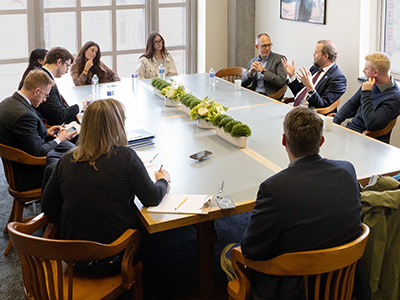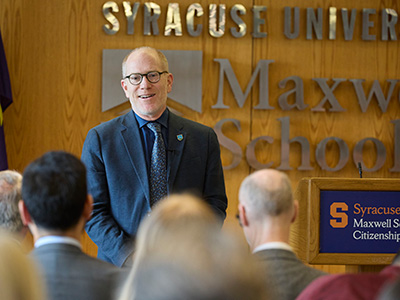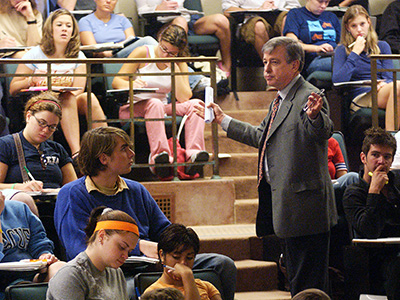
Maxwell at 100: Expanding Views of Citizenship and a Wider World View
June 13, 2024
The Maxwell School has evolved to meet the needs of an increasingly interconnected world while continuing its focus on citizenship.
On an afternoon in late March, a group of Maxwell School students gathered in the Moynihan Institute of Global Affairs for a private lunch with one of Europe’s most influential public officials.
The Council of Europe’s deputy secretary general, Bjørn Berge, spoke with students about the council’s role representing over 700 million Europeans. They discussed a range of topics including threats to democracy and efforts to establish pathways for Ukrainians to seek reparations from Russia for casualties of war. A few hours later, Berge gave a lecture to the University community in Maxwell’s Dr. Paul and Natalie Strasser Legacy Room.

Berge’s visit coincided not only with Maxwell’s 100th anniversary but also a recent agreement with the University to increase student internships and faculty research opportunities at council headquarters in Strasbourg, France. More broadly, it served as a tangible reminder of the school’s evolution since its founding from an institution with a mostly domestic focus to one that is truly global.
“Our roots may have been planted at a time when U.S. policies reflected a wariness of international affairs, but they draw from sources that cannot separate local, regional and national issues from the broader context of the world we inhabit,” says Dean David M. Van Slyke. “Maxwell has always focused on research, teaching and experiential opportunities that seek to understand this global context, to enrich both our domestic and international efforts and impact.”
Ahead of the Curve
In his proposal for a school of citizenship in the early 1920s, Syracuse University alumnus and trustee George H. Maxwell wrote of his desire to “develop a body of leaders, especially trained in U.S. citizenship, who will go out through this country as educators, statesmen, financiers, businessmen, etc., to upbuild the foundations and bulwarks of citizenship intelligently and patriotically.”
Behind this idea was a sense of alarm about the state of citizenship in the United States and what Maxwell described as “the general ignorance among the masses of our history, the principles of our government, its aims and safeguards.”
Coming out of World War I, attitudes towards the United States’ role in the world were split. Despite President Woodrow Wilson’s central role negotiating the Treaty of Versailles and the creation of the League of Nations as a forum for resolving international disputes, the treaty was rejected by the U.S. Senate and the U.S. never joined the League.
But in 1927, three years after the school’s founding, Maxwell would host the very first Model League of Nations Assembly on record, led by Professor of International Relations H. Duncan Hall. The entire event, which included 74 delegates from 11 upstate New York colleges representing 18 nations, doubled as the semester-ending session of the freshman citizenship course.
The tradition still thrives today through Maxwell’s award-winning Model-UN team—which offers credits for participation in fall and spring conferences—and a club offering opportunities to learn about the UN and debating techniques, as well as the process of writing and negotiating resolutions.
Other ‘firsts’ include the 1935 addition of Russian studies, which led to the launch of the nation’s first Russian studies degree for civilians in 1943.
After World War II, the global footprint continued to grow. In 1952, Dean Paul Appleby made his first of several trips to India to research and develop a report that became the foundation for the Indian Institute of Public Administration. His successor, Harlan Cleveland, soon after launched the study of public service overseas, which prompted the introduction of a foreign residency requirement for students planning to work internationally.
“At Maxwell today, international programs and research opportunities are embedded throughout our curriculum,” says Brian Taylor, professor of political science and director of the Moynihan Institute of Global Affairs.
The institute, which was founded in 1994 and later endowed by the U.S. Congress to honor the late Senator Daniel Patrick Moynihan, provides support for these efforts and is home to numerous regional centers such as the Center for European Studies, the East Asia Program, and the Maxwell African Scholars Union to name a few.
Like its agreement with the council, the school maintains relationships in key regions across the globe that enrich research and learning. Examples includes Maxwell’s midcareer training programs for government officials from India and Kazakhstan, agreements with universities in the Republic of Korea, and the school’s participation since 2009 in the Hubert H. Humphrey Fellowship Program—an endeavor that has brought 172 fellows from 77 countries to Maxwell.

Additionally, faculty are deeply engaged in research across the globe, from Thomas Perreault’s study of high-altitude peatlands near the border of Bolivia, to Catherine Herrold’s exploration of grassroots change in Serbia, to Michael J. Williams’ recent Fulbright-supported trip to Brussels to advance his research on NATO and Russia. Roughly one-third of the faculty focus exclusively on international topics. Another third explore mostly domestic affairs, and the remaining third examine both.
Maxwell’s full-time students are similarly attuned to global affairs; its roughly 3,000 students come from 45 countries. “They came of age during a global pandemic, when public health decisions made half a world away had a material effect on their educational experience and the health of their loved ones,” says Taylor. “You can’t set foot in a classroom or walk across campus without witnessing their dedication to activism for a range of global challenges, be it climate change, immigration or the fate of democracy around the world.”
This, according to Robert McClure, professor emeritus of political science and public affairs and former senior associate dean, is at the heart of a Maxwell education—whether domestic or international.
To McClure, who retired in 2014, the heart of citizenship is “respect for disagreement and teaching people how to disagree.”
He adds, “A good citizen in my view will protect the lone dissenter in saying the most outrageous things.”
Citizenship and Public Affairs
Among the first offerings of the new School of Citizenship and Public Affairs envisioned by George H. Maxwell was the course Introduction to Responsible Citizenship, developed by inaugural Dean William Mosher. Though the concept of citizenship education at Maxwell has faced examination and evolution through the decades, the foundations of the course have endured.
Also known as Cit 1, the course provided an interdisciplinary, team-taught approach that laid out the fundamentals of democratic governance, applied to contemporary issues. Late Professor Emeritus Ralph Ketcham, who began teaching the curriculum in 1951, once said, “The idea was to get some sense of both the philosophy of self-government and the responsibilities this placed on citizens.”
Until 1960, the course was required for all first-year students; but in the aftermath of World War II and the McCarthy era, the idea of promoting citizenship seemed out of step. Many of the hallmarks of the citizenship teachings shifted to public affairs, especially in the 1970s when Professor William Coplin introduced the public affairs major (renamed policy studies) emphasizing professional skills, community service and his simple message to “do good.”
Ketcham later helped develop a public affairs course that revived the approach of Cit 1. Robert McClure says he and faculty colleague David Bennett often taught the course together, with each taking a different stance on a timely topic for a debate in front of students. “I had a phone call from a student one day after David and I had debated something on Lyndon Johnson,” remembers McClure. “They wanted to berate me because they felt I had been nasty to David. We had a good laugh because David was one of my closest friends—this was a debate of substance and sharp contrast. That’s how it worked.”

McClure infused new life into Maxwell’s citizenship programming in the early 1990s by helping establish the MAX Courses. Both domestic and globally focused, the courses were designed to be forums for “serious examination of issues that we collectively had to address,” says McClure.
Today, a trio of MAX Courses—Critical Issues in the U.S., Global Community, and Quantitative Analysis for the Social Sciences—are overseen by the Robert D. McClure Professor of Teaching Excellence. Current McClure Professor Margarita Estévez-Abe, associate professor of political science and O’Hanley Faculty Scholar, believes that familiarity with many cultures and perspectives is a requirement for good citizenship.
“MAX Courses offer a unique opportunity for undergraduate students to experience and learn from a wide-range of disciplines and diverse perspectives,” says Estévez-Abe, who was raised in Asia and Europe.
In 2013, the school launched the Citizenship and Civic Engagement Undergraduate Program with the MAX Courses at its core and an emphasis on community engagement, locally and internationally. It now boasts approximately 190 graduates.
Compromising and Critical
Back in the Moynihan conference room this past March, during the luncheon with students, the conversation with Bjørn Berge turned to a closing question. “What does citizenship mean to you?”
Berge paused to reflect and then echoed what Robert McClure noted above.
In its most simple terms, he told the students, citizenship asks, “that you are able to listen to another person and to what they have to say, and that you are able to agree that you can disagree.” Further, he said, “that you are able to respect the other person’s opinion, that you are also able to sit down and discuss and find a way where you possibly can find an agreement together, a compromise.”
Today, however, it may not be enough, added Berge. “Because we are bombarded with disinformation and fake news, you have to orient yourself, and you have to inform yourself,” he said. “And how do you do that in this landscape we are in today? Maybe you need to also have awareness and to be critical of a lot of what you hear.”
By Jessica Youngman
Published in the Spring 2024 issue of the Maxwell Perspective
Related News
School News

Apr 17, 2025
School News

Apr 16, 2025
School News

Apr 15, 2025
School News

Apr 2, 2025